Sheila Wray Gregoire's Blog, page 74
September 24, 2019
10 Tips to Stay Attractive for Your Wife
How can husbands stay attractive for their wives?
Often the question is flipped around, and although we’ll be addressing the same question for wives later this month, we wanted to start with the men for once!
When you’re dating, it’s natural to put a lot of effort into being attractive for your new girlfriend. But what about when you’ve been married for a while? What kinds of things can you do that turn your wife on (or even just don’t turn her OFF!) to keep that spark alive years into a marriage?

We decided to go to Facebook and ask the wives of To Love, Honor and Vacuum to let us know what their best non-shaming tips for men were to help them stay attractive for their wives!
I need your help! What's are some quick tips (non-shaming, please!) for how a husband can stay attractive to his wife?
Posted by To Love, Honor and Vacuum on Monday, September 23, 2019
The responses fell into two camps: physical actions and then character traits that made women attracted to their husbands. So here are 5 of each so you guys can get a glimpse into the minds of women to figure out just what is it that makes wives madly attracted to their husbands! Let’s go!
5 Ways to Care for Yourself Physically to Stay Attractive to Your Wife
1. Practice good hygiene
This was by far the most commonly mentioned point, and one we get emails about quite often. Like I mentioned yesterday, the number of women writing in that their husbands don’t brush their teeth is rather astounding.
Men: if you’re not showering, not brushing your teeth, and throwing good manners out the window when your wife is around, don’t be surprised if she doesn’t seem so excited to make out!
Just plain trying, show he cares about how he presents himself to his wife. All the basics of personal hygiene and core good manners.
Remain attentive to his hygiene, regular showers, trimming fingernails and toenails, attention to details… clean socks (dirty ones in hamper, not on the floor) all very doable regardless of appearance or body habits.
Brush your teeth, or use mints or gum before coming home to your wife
Close his mouth when he burps, and try to pass gas discreetly.
If he works outside and gets all sweaty, he takes a shower afterwards. My husband is 46 and still looks amazing to me!
When listing out a bunch of these physical hygiene habits that make men attractive, one commenter said this:
You’d think these things would be a minimum standard, but I’ve heard many women lament about husbands by-passing these basics.

September 23, 2019
Reader Question: How Do I Get My Husband to Quit Smoking?
What do you do if your husband smokes, and you hate it, and you want him to quit?
On Mondays I try to post reader questions and take a stab at answering them, and here’s one on a subject that a number of people have sent in. One woman writes:

Reader Question
My husband works long hours at a job where everyone smokes. He used to smoke as a teenager, but then he quit, but now, ten years later, he’s taken it up again because everyone at work does. He knows I don’t like it, but he says it relaxes him. How do I get him to quit?
Great question!
My quick answer: you can’t. You can’t change anybody else.
But you can put boundaries around what you will accept, and you can also try some positive ways of helping him quit. I don’t have a definitive answer here, because I don’t think there is one, but I’m just going to post a whole bunch of quick thoughts, and then I’ll ask you all to chime in and tell me what you think!
Drawing boundaries when your husband smokes and won’t quit
1. Say no smoking in the house
It’s okay to say to him: “When you smoke in the house, I can’t get the smell out. I have to wash everything down, and the smell still lingers. I don’t like that. I won’t live in a house with smoking inside. So if you’re going to smoke, I’m going to ask you to do it outside.”
That actually shouldn’t be too difficult, because likely at work he has to smoke outside, too.
2. Say no smoking around the kids
I don’t know if you have children, but you can say to him,
Do you want our children to grow up healthy? Do you want them to grow up to become smokers?
I’m sure he’ll give the right answers. Who wants their kids to grow up smoking? Then just simply tell him that kids are three times as likely to smoke if they have a parent who smokes. You teach the kid that they should use cigarettes to calm nerves, and you tell them that all those health scare tactics to get people not to smoke isn’t that big a deal, because you ignore it.
Plus, second hand smoke is dangerous. So tell him that he can’t smoke around the children.
3. Refuse to kiss him if he has smoked or hug him if he hasn’t changed clothes or had a shower
My second-hand on the blog, Tammy, is a military chaplain’s wife, and she’s walked this route with so many wives in the past. And she always gives simple advice: Don’t kiss an ashtray. If he smokes, his breath will stink. And you can refuse to go near him if he’s smoked, or if he hasn’t changed clothes/showered. Make him brush his teeth if he wants to kiss, and make him shower and change if he wants a hug or anything else.

I’m not saying refuse to have sex. I am saying that it’s okay to not kiss someone when kissing them is highly unpleasant (on another note: we get questions all the time about husbands who refuse to brush their teeth. Nothing about smoking, but just guys with no hygiene. Why is that?)
Are you GOOD or are you NICE?

Because the difference matters!
God calls us to be GOOD, yet too often we’re busy being nice. And sometimes, in marriage, that can actually cause problems to be even more entrenched.
What if there’s a better way?
Take me to it!
Look to the future without cigarettes
Those are the boundary things you can put in place for yourself and your family. Now let’s talk more about visioning!
4. Ask how he pictures his future
Talk about the future. Does he want to be smoking in ten years? Does he want to play with his grandkids? Does he want to enjoy hiking and outdoor activities without getting winded when he’s in his 50s? Then he has to stay in better shape now. If he doesn’t want to be smoking in ten years, or in five years, then you may as well quit now!
5. Calculate how much smoking is costing you, and decide something you can do instead for that amount of money
Here’s some info I found on how much cigarettes cost you:
From How Much Does Smoking Cost You?
According to the Centers for Disease Control and Prevention, the average cost of a pack of cigarettes is $6.28, which means a pack-a-day habit sets you back $188 per month or $2,292 per year. Ten years of smoking comes with a $22,920 price tag.
In Canada, it’s much worse, because here a pack of cigarettes I think is close to $16. In fact, in Canada, giving up smoking a pack of cigarettes a day is basically your car payment.
However much cigarettes cost in your jurisdiction, figure out how much it costs him to smoke over the course of a year. Now think of something else that he’d really like. Make a promise that no matter what it is (even if you think it’s stupid), he’ll have your full endorsement to buy it in a year if he gives up smoking. Keep the jar in your kitchen, and add to it everyday. If he smokes, though, the jar gets emptied and you start again. It’s not like he can get away with just smoking one pack and keeping all that money. Nope. You’ve got to quit!
I know two different families where he spends so much on beer and cigarettes that the family has never been able to save for a downpayment. They’re always short of money, and much of it is because of all that gets wasted on these vices. If you figure out how you could be living without cigarettes, that makes a big difference.
6. Think about a new job
I don’t know how possible this is for him, but if the issue with smoking started at his work, can he work somewhere else? Can he get a different trade? I know smoking is really big in a lot of those jobs where there’s nothing to do for long periods of time, like guys who work on the oil rigs for months at a time, or the military, or security. Perhaps that lifestyle just doesn’t work with him. Is there something else he could be doing?
If you want a good way to vision together, you can download my visioning worksheets and work through them with him! This lets you have these conversations without sounding accusatory. You’re simply planning for the future, and then he’ll likely come to a lot of these same conclusions himself. Download them by filling in the form below!
Focus on making the here and now better
7. Quit something with him
Quitting is hard. Really hard. Show him you understand that by quitting some vice that you have, too, that you really hate. Maybe you resolve to lose some weight. Maybe you quit an addiction to diet pop, or to watching certain shows, or to TV in general. You know the one big thing that keeps you from living the life you want. Can you give that up to help him have someone to walk through this with?
8. Start something new
Is there a new hobby you guys can start in the evenings, so he isn’t bored and itching to go have a cigarette? Can you start a new routine right after dinner where there’s something to do, so he doesn’t have time to go grab a cigarette? Can you fill up your evenings more with volunteering or with activities? Can you get out and walk or start a sport together so you’re more active? If you can reduce the natural downtimes where he’d normally have a cigarette, he may not feel the pull quite as much.
Yes, this one requires you changing your life. But like I said–it’s hard to quit. If you want him to quit, and you want to help him, it’s going to be inconvenient for you, too. But it’s worth it!
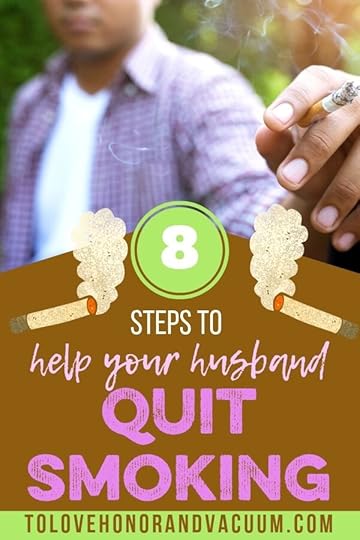
Okay, those are the ideas that I’ve got. What about you? Any thoughts on how to help a husband quit smoking? Let’s talk in the comments!
Author
Social Media
Sheila's Best Posts
Books
Courses
Freebie
 Sheila Wray Gregoire has been married for 27 years and happily married for 22! She loves traveling around North America with her hubby in their RV, giving her signature "Girl Talk" about sex and marriage. And she's written 8 books. About sex and marriage. See a theme here? Plus she knits. Even in line at the grocery store.
Sheila Wray Gregoire has been married for 27 years and happily married for 22! She loves traveling around North America with her hubby in their RV, giving her signature "Girl Talk" about sex and marriage. And she's written 8 books. About sex and marriage. See a theme here? Plus she knits. Even in line at the grocery store. Find Sheila Here:
Find Sheila Here:YouTube
Sheila's Favorite Posts on To Love, Honor and Vacuum:
10 ways to initiate sex
10 Effects of Porn on Your Brain, Marriage, & Sex Life
Why So Much Marriage Advice is So Trite
How can Sex be Hot and Holy at the Same Time?
Check out some of Sheila's Books:
The Good Girl's Guide to Great Sex
31 Days to Great Sex
9 Thoughts That Can Change Your Marriage
To Love, Honor, and Vacuum
Check out Sheila's Courses:
The Boost Your Libido Course
The Whole Story: Talking to Your Daughter about Sex, Puberty, and Growing Up
The FREE Emotional Intimacy E-Course
Are you ready to take your marriage to the next level?
Sign up for our emails and get access to the TLHV free marriage and parenting resource library. We have over 25 downloads and are constantly adding more. Sign up here!
September 20, 2019
You Can’t Recover from Porn by Running Away from Women
If a man is trying to recover from a porn addiction, does he need to detoxify by making sure that he never sees any woman who could be alluring?
One of the biggest searches that land people on this blog is for the effects of porn on the brain, and so I have a lot of readers for whom pornography has been a huge problem in their marriages. I have tried to address what you must do if your husband uses porn, and how to recover intimacy after a porn addiction–and so much more. I have talked about the three stages of porn addiction recovery. And I have even written about women and porn!
But I still think there’s a fundamental disconnect when it comes to our understanding of the nature of a porn addiction which makes getting over it that much harder. So let’s go back to first principles for a moment and see what real recovery from a porn addiction looks like.
Porn rewires the brain so that what becomes arousing is an image or a video rather than a person.
Porn turns sexual arousal and sexual response into something that is linked to seeing women solely as sexual objects, and in seeing sex as something which is only self-focused. It’s about the porn user receiving sexual gratification; it has nothing to do with thinking about the other person, let alone seeing that woman as someone with feelings, needs, or desires of her own. She is there only to use and to derive sexual satisfaction from. With that background, let’s picture what happens in the typical marriage when a porn addiction is discovered.
He is now in a lifestyle where he needs pornography to fuel his sexual desire and sexual response. His body has been trained to respond to porn. And a big part of that is seeing women as objects, as something that exist for him to use. Thus, it’s hardly surprising that many men who are recovering from a porn addiction (or who are in the middle of a full-blown porn addiction!) have difficulty with lusting after other women in public.
Porn is not a substance abuse problem. Porn is a substance misuse problem.
(Click here to tweet this quote)
Going to the beach becomes a difficult thing because everywhere are these women that he can see in various states of undress, and he inevitably will think of them as objects. Going to the mall is a similar landmine because there are lingerie stores, with cut outs of women in bras and panties. Going on regular websites is difficult because there could be ads for vacations in the Caribbean featuring women in bikinis, or ads for some sort of lingerie. Everywhere they look, the world is now dangerous because their brains turn immediately to lustful, sexual thoughts.
Now, the wife of the porn addict likely realizes this, and she’s devastated. She wants him to stop lusting. And so what is the solution? The only option seems to be to prevent him from seeing any of those women or images of those women. I have seen it in so many women’s writings online, writings that I know come from a place of deep pain, where they’re begging women and girls to stop wearing revealing swimsuits, and to go back to modest one-pieces, preferably with T-shirts over them, because it’s just too hard for the husband to go to the beach now.
They don’t want their husbands to go to the mall. When they’re driving, they try to distract him when they go by a certain billboard. These women become hyper-vigilant for anything that could cause their husbands’ minds to go in that bad direction.
Let me suggest that when we start viewing women’s bodies as a threat we actually solidify the porn addiction.
I know this is controversial to say, and I’m not trying to defend the ads for vacations in the Caribbean or lingerie stores or anything like that. I’m just saying this: Porn is a problem because it objectifies women and treats all women as if they exist to service a man sexually. When we think that men will inevitably lust if they see a woman’s body, we actually agree with porn’s definition of the world and of women in particular.
Porn is a problem because it objectifies women and treats all women as if they exist to service a man sexually. When we think that men will inevitably lust if they see a woman’s body, we actually agree with porn’s definition of the world and of women in particular.
(Click here to tweet this quote)
Finding this post helpful? You may also benefit from:
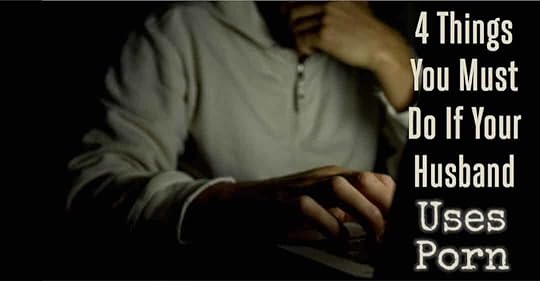
4 Things You Must Do if Your Husband Uses Porn
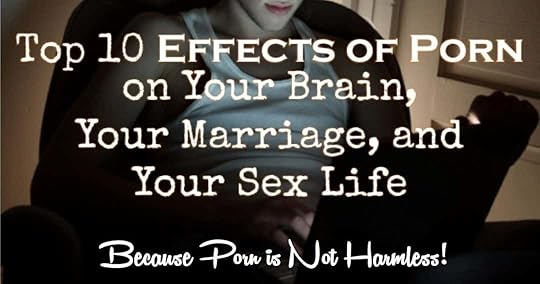
10 Things to Know About How Porn Affects Your Sex Life and Marriage

Is Porn Stealing His Sex Drive?

You Can Recover From Your Husband’s Porn use
The way to get over porn is to stop agreeing with porn and to start re-framing how we see women and how we see sex.
A porn addiction, while it has some things in common with an alcohol addiction or a drug addiction, also has a lot of things that distinguish it from those two things. An alcohol or drug addiction is a substance abuse problem–people take a substance which is mood or mind altering and use it too much.
Porn is not a substance abuse problem. Porn is a substance misuse problem.
There is nothing wrong with sex. There is nothing wrong with women’s bodies. There is nothing wrong with men and women relating to each other. But there is something hugely wrong with how porn sees sex, how porn sees women’s bodies, and how porn sees the relationship between the sexes. Porn warps something which is good. The way that you get over a substance abuse problem, you see, is to stop using that substance. The way that you get over a porn abuse problem, though, is quite different. It’s to stop using porn, yes. But it’s also to stop misusing the elements that go into porn. It’s to stop agreeing with pornography about the nature of women’s bodies, the nature of the relationship between the sexes, the purpose of sex.
I’ve talked before about the 3-fold nature of a porn recovery.
First, you need to get rid of the porn altogether, which I firmly believe should include some sort of filters on your computers, phones, and devices. I have recommended Covenant Eyes for years, and they have a great program that can filter what you can access, which takes away that initial temptation. It doesn’t stop all porn use.
Yes, there may be ways around it. But it makes it harder to access porn. It’s no longer a split second decision, so that there’s a lot more time for people to think, to listen to the Holy Spirit, to withstand that temptation. However, I have also been very vocal that this is only the first step. This just sets the groundwork so that the real healing can take place -healing that usually requires an accountability group and counseling, to help people re-frame sex again, and to help people understand how porn became a coping mechanism and often stunted emotional growth. It’s these latter steps that actually cure a porn addiction, not the first one. The first one simply gives the porn user space to work on things.
Find freedom from porn!
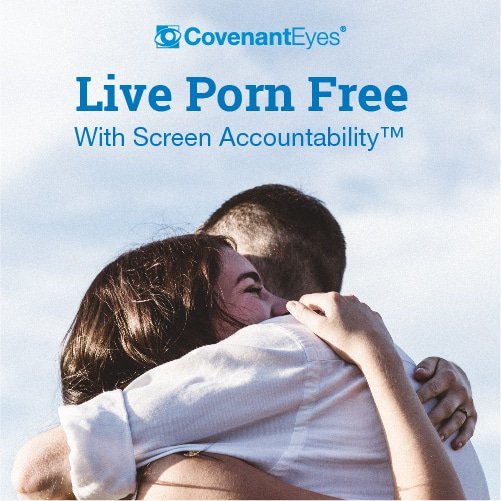
Your marriage, and your thought life, do not need to be held captive to pornography.
There is freedom.
Beat porn–together!
I want to find freedom!
So let me reiterate:
We can’t solve a porn problem if we continue to see women’s bodies as inherently dangerous, because it’s agreeing with porn about the nature of women’s bodies.
That’s also why, in an earlier post about overcoming lust, I was so adamant that in churches we need to become more breastfeeding friendly. If boys grow up seeing that women’s bodies are not only sexual, then it’s easier to withstand lust because you already are rejecting a basic premise of pornography.
Quite frankly, if your husband has used porn and now he can’t walk through a mall, see a billboard, go to the beach, go to a travel agency, or even pick the kids up from a youth group pool party, then there is some serious work to do. And that work cannot be about women learning to cover up; that work needs to be about learning to see women as whole people, and learning to value women as people.
When we continue to treat women as if they have “cooties” and they’re dangerous, then we’re reinforcing the whole issue that porn has caused. The way you fight against objectifying women is to stop objectifying women. Talk to women. Ask women’s opinions. Go out in mixed groups and have conversations that involve both men and women. Read about amazing women. See women as people, not as dangerous things.
With alcohol, it is possible to get rid of all the booze from the house and stay away from places where booze is likely to be. You simply can’t live your life avoiding women, and nor should you. Instead of trying to limit the encounters a porn user can have with women who might be temptresses, a better model is to start helping your husband see women as people. Otherwise we’re just agreeing with porn, and that will never, ever end the hold that porn has on him. If you want to break the addiction, you have to stop agreeing with the mindset.
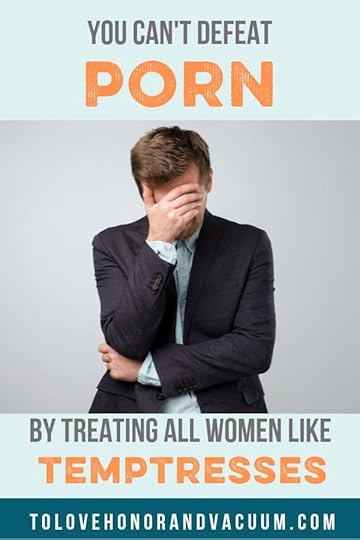
Does that make sense? I’m not sure how to make this practical or how to completely live this out, but I’d love to talk about this in the comments!
Author
Social Media
Sheila's Best Posts
Books
Courses
Freebie
 Sheila Wray Gregoire has been married for 27 years and happily married for 22! She loves traveling around North America with her hubby in their RV, giving her signature "Girl Talk" about sex and marriage. And she's written 8 books. About sex and marriage. See a theme here? Plus she knits. Even in line at the grocery store.
Sheila Wray Gregoire has been married for 27 years and happily married for 22! She loves traveling around North America with her hubby in their RV, giving her signature "Girl Talk" about sex and marriage. And she's written 8 books. About sex and marriage. See a theme here? Plus she knits. Even in line at the grocery store. Find Sheila Here:
Find Sheila Here:YouTube
Sheila's Favorite Posts on To Love, Honor and Vacuum:
10 ways to initiate sex
10 Effects of Porn on Your Brain, Marriage, & Sex Life
Why So Much Marriage Advice is So Trite
How can Sex be Hot and Holy at the Same Time?
Check out some of Sheila's Books:
The Good Girl's Guide to Great Sex
31 Days to Great Sex
9 Thoughts That Can Change Your Marriage
To Love, Honor, and Vacuum
Check out Sheila's Courses:
The Boost Your Libido Course
The Whole Story: Talking to Your Daughter about Sex, Puberty, and Growing Up
The FREE Emotional Intimacy E-Course
Are you ready to take your marriage to the next level?
Sign up for our emails and get access to the TLHV free marriage and parenting resource library. We have over 25 downloads and are constantly adding more. Sign up here!
September 19, 2019
An Example of What Gaslighting Women Using the Bible Looks Like
Tragically, too often in “Christian” teaching women’s views are ignored, or “gaslighted”.
It’s time for a new To Love, Honor and Vacuum podcast, and this one’s a doozy, and a bit of a departure from my normal podcasts.
Recently, readers sent to me an email and a blog post that Emerson Eggerichs, the author of Love & Respect, had written, and they wanted to get my take on it.
I didn’t want to write about it in a blog post, because I’ve already written four posts explaining the faulty and dangerous teaching in the book.
See what else we’ve written on Love and Respect:

How Love & Respect Gets Sex Horribly Wrong

Why Unconditional Respect Doesn’t Work

The Fundamental Flaw in the Book Love & Respect

It was such a horrendous blog post, though, that I thought it was worth doing a podcast on, because that’s where I get to share in the most depth. I showed Keith the blog post, and he asked to record this podcast with me. So we read Eggerichs’ blog post, paragraph by paragraph, and dissected the trouble with it.
Please listen in. It’s a longer one, but it’s important.
If this isn’t your cup of tea, that’s okay. Regular programming will resume next week! But we felt this simply had to be addressed (and thank you for those of you who sent it in! I wouldn’t have seen it otherwise).
Here’s Keith and me:
A woman is writing in saying that Love & Respect caused the men in her group to become condescending and dismissive of their wives.
In the blog post, Emerson Eggerichs explains why the women are wrong.
Here’s the question that he was asked:
This material is excellent and much needed. We have read the book and attended a conference and been blessed by the material. We have just completed facilitating our first small group DVD teaching. We are hesitant to do another until we deal with the following issue. There is one area we are having difficulty with and want very much to discuss it with someone. For the most part the men in our small group are not “getting” that their wives have insight also. There being a scriptural command to respect and value men does not give license for them to disregard what their wives think. If there is one weakness in the material, we are finding it is the omission of the value of a woman’s insight; not as the leader but as an integral part of information gathered for the decision-making. . . . While this is not a problem in our own marriage, it seems to be a major one for the other couples. Listening to the material seems to have swung the pendulum the other direction so far. How to love your wife is being translated into a condescending attitude. Hope you can help.
Basically, she’s saying that the book study made the husbands act worse. And then Eggerichs replies, telling the woman that all of these wives’ perceptions are most likely off, likely because they’re being contentious and nagging.
Many of you have asked for transcripts of the podcast, and I haven’t done any so far. But for this podcast, we did have notes. We copied his entire blog post, and then paragraph by paragraph inserted what we wanted to say. So if you would like to read our notes, you are more than welcome. These are not a transcript of the podcast; we didn’t say everything that was here, and we said lots that isn’t here. But the main stuff is all here.
His blog post is in black; all the other colours are from different members of my team, who all collaborated on this document. Feel free to download these notes and follow along, or read them on their own!
Download the Report
A few other things mentioned in the podcast that you may find helpful:
10 Signs You’re in a Legalistic Church
Our Original Report of the Harm Done by Love & Respect
John Gottman’s book that we reference: 7 Principles for Making Marriage Work
Our podcast from 2 weeks ago on What Headship Really Means
And if you’re in a marriage where your spouse is treating you in a condescending way, or emotionally abusing you (or abusing you in other ways), see these resources:
 Boundaries in Marriage
Boundaries in Marriage Is It Me? Making Sense of Your Confusing Marriage
Is It Me? Making Sense of Your Confusing Marriage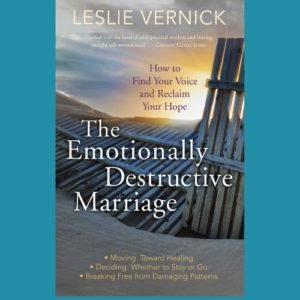 The Emotionally Destructive Marriage
The Emotionally Destructive MarriageWe said so much in the podcast I can’t repeat it all here.
But I will say this:
If a pastor/writer/teacher tells you that disagreeing with them means that you’re disobeying Scripture or rejecting God, that’s wrong. It’s okay to examine things for yourself.
If a pastor tells you that you shouldn’t listen to your instincts (really the Holy Spirit’s voice inside of you), because you’re more easily deceived, that’s wrong.
If you go to a pastor/leader with a problem because you’re feeling dismissed and vulnerable, and you’re told that you have no reason to feel that way because no one is doing anything wrong to you, and the problem is you, that’s wrong. You matter, and what you feel matters.
If a pastor/leader tells you that it’s understandable if someone treats you badly simply because you didn’t ask in the right way, that’s wrong.
If a pastor/leader puts more onus on one person to act like Jesus than another, that’s wrong.
If a pastor/leader gives one person in the relationship the power to determine if the other person is acting according to Christ, that’s wrong. Whether or not you’re doing right is about whether you’re acting like Christ, not whether or not someone approves of you.
If a pastor/leader tells you that the way you follow Jesus is by following another person, that’s wrong.
Please, church. We can do better than this. We must do better than this.
I made an effort in 9 Thoughts That Can Change Your Marriage to give a balanced view of marriage, to show what marriage would look like when you’re dedicated to serving and loving the other person, but you’re also dedicated to intimacy and truth, which involves sharing your feelings, growing together, and not enabling sin. This is what marriage should look like.
Are you GOOD or are you NICE?

Because the difference matters!
God calls us to be GOOD, yet too often we’re busy being nice. And sometimes, in marriage, that can actually cause problems to be even more entrenched.
What if there’s a better way?
Take me to it!
Next week, we’ll be starting a new segment on the podcast, where the last podcast of every month is directed at men. And this month’s is going to be a fun one! So we’ll be back to regular programming. But I feel as if, since I’ve spoken up on this stuff at length, I now have an obligation to speak out again when I see things that are really heinous. So thank you to those who brought this to my attention, and I pray for a day when there is no need to make a podcast like this one, because we are all once again focused on Jesus, not focused on the man being in charge.

Did you listen to the podcast? Tell me what you think. And Keith really wants to know, too. I’m so glad he wanted to do this one with me! Let’s talk in the comments.
Author
Social Media
Sheila's Best Posts
Books
Courses
Freebie
 Sheila Wray Gregoire has been married for 27 years and happily married for 22! She loves traveling around North America with her hubby in their RV, giving her signature "Girl Talk" about sex and marriage. And she's written 8 books. About sex and marriage. See a theme here? Plus she knits. Even in line at the grocery store.
Sheila Wray Gregoire has been married for 27 years and happily married for 22! She loves traveling around North America with her hubby in their RV, giving her signature "Girl Talk" about sex and marriage. And she's written 8 books. About sex and marriage. See a theme here? Plus she knits. Even in line at the grocery store. Find Sheila Here:
Find Sheila Here:YouTube
Sheila's Favorite Posts on To Love, Honor and Vacuum:
10 ways to initiate sex
10 Effects of Porn on Your Brain, Marriage, & Sex Life
Why So Much Marriage Advice is So Trite
How can Sex be Hot and Holy at the Same Time?
Check out some of Sheila's Books:
The Good Girl's Guide to Great Sex
31 Days to Great Sex
9 Thoughts That Can Change Your Marriage
To Love, Honor, and Vacuum
Check out Sheila's Courses:
The Boost Your Libido Course
The Whole Story: Talking to Your Daughter about Sex, Puberty, and Growing Up
The FREE Emotional Intimacy E-Course
Are you ready to take your marriage to the next level?
Sign up for our emails and get access to the TLHV free marriage and parenting resource library. We have over 25 downloads and are constantly adding more. Sign up here!
September 18, 2019
How to Help Dads be PARENTS, Not Feel Like Glorified Babysitters
This month, on Wednesdays, I’m writing about how the way we just do life in general can interfere with our marriage and our sex life. As the school year gears up again, I’ve been encouraging us to look at the causes of stress in our marriage, and the different kinds of marriage problems that we have. I talked about kids’ schedules and getting those under control, and in our podcast last week I talked about how to figure out what little things are making sex more difficult for you.
Today I want to talk about another habit we can get into in our day-to-day lives when it comes to looking after kids–we make it mostly a mom’s job, and dad is seen as just the occasional baby-sitter.
Now, I have no problem with one spouse doing 100% of the housework, if that’s how it works best for you. When Keith was in medical residency and working 120 hours a week, when he was home, I didn’t want him mopping floors. I wanted to spend what little time we did have together, and I wanted him with the kids. So I did pretty much all the housework. And over the years, I’ve done most of it because I’ve been home during the day (that’s switching now, as I work more than he does).
But childcare is a different matter. Children are not tasks; they’re people. They need BOTH parents. To think, “Well, I work full-time and she’s home with the kids, so the kids are hers to look after”–well, that doesn’t work. Childcare is not the same thing as housework or paperwork or mowing the lawn–it’s a relationship. You don’t get to “clock in and clock out,” or just check off a list (“Well I’ve changed 2 diapers today so I’m all done.”).
Childcare isn’t a 50-50 split. It’s a relationship that requires 100% from both of you because your child needs 100% of you. Your kid doesn’t need half a dad and half a mom–he (or she) needs two parents who are fully devoted to raising him the best they possibly can.
I asked Rebecca to write this one up for me, since she and Connor have been talking about this a lot lately as they’re about to become parents. And here’s how they’ve been wrestling through it:

General principles for both parents to live by
1. Always Assume You’re On Kid Duty
Unless you’re actively outside the house at work during your scheduled work hours, always assume that you are responsible for your child(ren). It’s not fair to simply make plans or make commitments without running it by your spouse first. Want to go to a friend’s place after work one day? Run it by your spouse to make sure you aren’t needed at home. Want to get involved in a volunteer effort? Talk it over as a couple to make sure it won’t put undue pressure on the other spouse.
This doesn’t mean you don’t ever get to do fun things–it just means that your default is, “I’ve got the kids.” If you are assuming that the other will take care of things, that is unfair and likely shows that you’re not taking your responsibilities as a parent as seriously as you should.
2. Time off for one should mean time off for the other
If you’ve run it by your spouse and he/she says “Go for it!”, it’s important that free time is given to them as well. If a husband goes out with the boys for a few hours on a Friday, he should give her some time soon to relax and do whatever she wants, too, whether that’s a 2-hour-long bubble bath or meeting up for coffee with friends while he has the kids.
It isn’t about making sure everything is “fair,” but more about getting into a routine where both people’s needs and wants are respected, versus getting into a habit of giving one person a lot of freedom while the other does all the work that allows for that freedom.

3. Taking care of children should not result in more work for the other than is necessary
If you’ve been busy watching the kids and so didn’t have time to do the dinner dishes like you normally would have, that’s one thing. But if you took care of the kids and now there are toys everywhere, smushed peas dried onto the tray because you didn’t wipe it off in time, and water all over the bathroom floor from bathtime, and you just kick your feet up because you’re done taking care of the kids and leave your spouse to clean up after you–that’s not acceptable.
As a general principle, if something is your responsibility, make sure it’s done properly. Meal time your job tonight? Clean off the high chair and put the leftovers in the fridge or freezer. Bath time your job? Wipe down the floor so that it doesn’t cause damage or your spouse to step in a puddle later. If you spend time playing with the kids, schedule that last 5 minutes to putting all the toys back in the toy box. It’s not difficult to do if you recognize that the task isn’t something you’re doing as a favour for your spouse, but because it’s an important task that is done for the family.

Ways Dads can make sure they’re parents, not just babysitters:
1. Ensure you actually know what goes into taking care of the kid
Do you know how to feed your child? If your baby is breastfed, do you know how to prepare pumped breast milk for her? Do you know which snacks the child should have and when? What about how much food to give during meal times?
The easy solution to make sure you know how to be your child’s parent is to rotate parenting duties with your spouse. Be the one who does feedings all day on weekends if you’re the one who works outside the home so that you can know what your child’s eating schedule is. Take care of bathtime during the week. Alternate who puts the child to bed so that both of you are able to complete his bedtime routine.
2. Do errands with your child
One of the biggest differences I see often among how dads act with kids versus how moms act is that moms assume the kid is coming with them when they run errands whereas the dad assumes that the kid is staying home.
When you go out to run errands, every now and then take the children with you. It’s good to learn to grocery shop with kids–that’s part of being a parent. It also provides good learning opportunities–you can quiz kids on different types of cars while you’re waiting on your oil change, or you can play I Spy while walking through the mall doing exchanges and returns.

3. Have dedicated time where you are taking care of the child without your wife around
This is especially important if you work outside the house and she is a stay-at-home mom. If that’s the case, she takes care of the child 40+ hours a week without your help, so you’re more than capable of giving her a few hours of uninterrupted kid-free time on a regular basis.
As well, this should include not texting her with questions about how to take care of the baby! Unless it’s vitally important that you ask specifically her, figure it out yourself (Google is a powerful tool). If you don’t know, consider asking your parents for advice! They raised you, after all, and would likely enjoy being able to help over the phone.
If you think this is unreasonable because she already knows all this and why shouldn’t you ask her, ask yourself–how does SHE know all this? Odds are she didn’t text you about it to figure it out, she researched it, she called other moms, she figured it out for herself. There is nothing stopping you from doing that, too! It just means you need to take ownership of your role as a parent and truly see yourself as a dad, not a glorified babysitter.
4. Have faith in yourself!
Recognize you are capable of being an awesome dad and an awesome parent. Many men enter parenting with less baby and kid experience than their wives simply because girls are more likely to grow up babysitting, taking care of kids, and being handed babies in social situations than boys are. But if you’re a dad who feels like he just doesn’t have a clue what he’s doing, take heart–you CAN do this, and you WILL learn as long as you put in the work.

Ways moms can encourage their husbands to be great dads:
1. Recognize that there is more than one way to skin a cat
You and your husband are likely going to do some things differently. That is perfectly OK. In fact, a lot of psychological research has found that it’s actually good for your kid to have these different influences! In general, dads tend to be rougher, louder, and more confrontational in their play (like playing “monster” and chasing a kid around the house) and in their parenting whereas moms tend to be more subdued, conversational, and emotions-focused. In other words, the mom is more likely to say “careful” and the dad is more likely to say “let’s see how fast you can really ride that bike down the hill.” (Obviously both sexes can do both, but that’s what studies have found.)
Beyond just play styles, though, understand that if something isn’t harmful or dangerous to your child, you need to give your husband room to just be a dad. If you want him to take ownership of fatherhood, you can’t keep him on a tight leash. Let him make decisions, give him freedom to try new things, and recognize that even if the kid doesn’t end up wearing an outfit you like all that much, that’s not a big deal when you put it in perspective.

2. Allow for a learning curve
When you’re tempted to say something like, “Just let me do it,” step back. Odds are, you have more experience with childcare than your husband, since girls are statistically more likely to have babysat or spent time with babies before having one themselves than men are. You had to learn these things at some point, too, and you were given the opportunity to learn them. If he’s bumbling a bit while changing a diaper, just leave and let him change the diaper. He’ll get better with practice, but he does need the practice.
 Raising Kids You Actually Like–Ebook
Raising Kids You Actually Like–Ebook$3.99
 To Love, Honor and Vacuum
To Love, Honor and Vacuum Why I Didn’t Rebel: Sheila’s Daughter’s Book!
Why I Didn’t Rebel: Sheila’s Daughter’s Book!3. Watch how you talk about your husband as a father
When we were first married, I was quite critical of Connor. Although I’m not 100% yet by any stretch of the imagination, a huge help to me early on was to take a day and imagine that I had a tape recorder of everything I said about my husband that would play back to my friends and family later. Every time I said something about Connor I’d ask myself–do I want my parents to hear that? Would I say that to his best friend? Would I say that to him?
It really made me realize how sometimes the way I thought or talked about him was simply not beneficial because it was unnecessarily harsh and belittling.
Try that exercise when it comes to talking about your husband as a dad. Do you talk about him with pride, love, and trust? Or do you scoff at how little he knows, how helpless he is, or how everyone would just starve or go naked if you weren’t around for a day?
Our words matter. If you want your husband to take parenting seriously and to feel confident as a dad, don’t say words that tear him down. Offer critiques when necessary, yes, but be very careful that the message you’re giving your husband is not, “I don’t trust you with our children.”

Those are our tips for helping both parents take ownership of raising the kids–what has worked for your family? And feel free to share awesome parenting win stories in the comments below! Let’s learn from each other’s successes!
Author
Social Media
Previous Posts
Products
Freebie
 Rebecca Gregoire Lindenbach is a 23-year-old Canadian blogger/author and the daughter of Sheila Wray Gregoire. Married since 2015, she is passionate about helping others challenge the status quo and live for more, whether in their relationships, their educational or occupational goals, or their walks with God. And yes, like her mother, she also knits.
Rebecca Gregoire Lindenbach is a 23-year-old Canadian blogger/author and the daughter of Sheila Wray Gregoire. Married since 2015, she is passionate about helping others challenge the status quo and live for more, whether in their relationships, their educational or occupational goals, or their walks with God. And yes, like her mother, she also knits.
 Find Rebecca Here:
Find Rebecca Here:
Facebook
Twitter
Instagram
Pinterest
Rebecca's Website
Other posts by Rebecca on To Love, Honor and Vacuum:
Retraining Your Brain to Fantasize about HIM--And No One Else!
Should it be a Struggle to Not Have Sex Before You’re Married?
10 of the Best Decisions You Can Make in Your First Year of Marriage
How To Not Be a Legalistic Parent
Why I Didn't Rebel (my most viral post ever)
Read the rest of Rebecca's posts on TLHV here!
 Check out Rebecca's book and course:
Check out Rebecca's book and course:
Why I Didn't Rebel. Ever wondered why some kids rebel and some don't? Or do you believe rebellion is inevitable? Rebecca interviewed 25 young adults and dove into psychology research to find out: what makes some kids rebel, and some stay on the straight-and-narrow?
The Whole Story: Not-So-Scary Talks about Sex, Puberty, and Growing Up. Scared to talk to your daughter about puberty? Rebecca and her sister Katie want to do the hard part for you. This course is designed to start conversations to bring you closer together and strengthen your mother-daughter bond while giving your daughter all the information she needs as she becomes a woman.
Teenage rebellion doesn't need to be a part of your family's story. You can help your kids live for more! Get the first chapter of Why I Didn't Rebel for free here!
September 17, 2019
4 Easy Habits to Become a “Porn Free” Home
Can you have a porn-free home?
I wish I could say, “absolutely!”, but I can’t. I don’t even like the title of this post, because it promises something I can’t deliver. I was thinking of “Porn Safe”, but that makes it sound like your home is safe FOR porn. Then I was thinking “Limit Porn”, but that makes it sound like there’s a safe time limit.
So here’s what I am saying: most of our kids are going to see porn. Most of our husbands are going to be tempted by porn. A large proportion of women are also going to be tempted and going to see it or seek it out at some point. Almost everybody is going to stumble across porn. There is nothing that you can do that will give you a 100% guarantee that no one will see porn.
But what you can do is create an environment in your home where a porn habit is far less likely to develop. And it’s the habit we want to avoid. And I decided that today, with Back to School upon us being a great time to institute new family habits, I thought I’d issue us our weekly challenge to create a home that’s far less porn-friendly and far more family-friendly.
The average age that kids are introduced to porn is quickly falling, to around 10. Teenage girls are becoming one of the fastest-growing groups of porn watchers. And most men battle with the temptation to look at porn. Let’s not assume that porn is something only moms of 15 or 16-year-old boys have to worry about.
We need to fight this fight for the sake of everyone in our family. That’s the environment we’re in. Now let’s look at the risk factors.
Full disclosure: I’m an affiliate for Covenant Eyes–but that’s only because I really believe in them! I’m so glad there’s a company aiming to help protect families from porn, and I hope they can help you, too!
When do people tend to form porn habits?
When porn is easy; when they’re bored; when they’re stressed; and when they’re alone. If we can limit those risk factors, then we limit porn! And that’s what I want to stress today–have a game plan and limit those factors. So here we go:
1. Subscribe to Covenant Eyes
It’s a program that runs in the background of your computers, laptops, phones and other devices that can either filter what sites you’re allowed to go to based on each person’s profile, send accountability emails of searches or websites visited to an accountability partner, or both. And it’s not dependent on your wifi, so it goes with you, your husband or child outside of the house, too.
Look, if people know that if they search for something pornographic, an accountability partner will get an email, it reduces the risk that they’ll search. And often kids come upon porn sites inadvertently by searching for something they don’t realize sounds pornographic. Covenant Eyes makes sure that doesn’t happen. And you get one month free when you sign up with my link!
Find freedom from porn!

Your marriage, and your thought life, do not need to be held captive to pornography.
There is freedom.
Beat porn–together!
I want to find freedom!
2. Set Up a Technology Center in a Central Place
Buy a charging station where everybody can dock their phones, tablets or iPads. Then, make it a habit that at mealtimes, all devices go there so you can enjoy family time. And at bedtime, everyone’s devices return there to be charged overnight. No one has their devices in the bedroom with them! It’s late at night that teens (and adults) often start surfing the internet. And if the devices aren’t there, they can’t. Let’s get back to reading books at night or talking rather than being plugged in, since research has also consistently shown that using devices late at night makes you sleep worse, anyway–especially for teenagers.
Let’s not assume that porn is something only moms of 15 or 16-year-old boys have to worry about. Almost everybody is going to stumble across porn.
(Click here to tweet this quote)
3. Turn the Wifi Off at Night
You’re allowed to, you know. And when you unplug at dinner and unplug at night, stress is also likely to be reduced because everyone will talk to each other more, and turn to more social forms of entertainment. Create a culture in your home where the internet isn’t with you 24/7, and people turn to each other instead. It will never guarantee there won’t be problems, but it will help you build the kind of family where it’s less likely. And then you’ll also have the kind of family where if there is a problem–you’re far closer and better equipped to deal with it!
4. Talk to Your Kids about Porn and How Habits are Formed
This one’s a little bit scarier, so I’ve saved it for last. This is a conversation that you can’t ignore, because it’s important. When kids see pornography at a young age, it’s really a form of trauma for many of them. It’s horrendous. It hits them like a sledgehammer, and those images stay and they don’t know what to do with them.
And since most kids see porn because they stumble across it by accident or because other kids show them, you can’t eliminate the danger on your own. It’s better to prepare them for it.
I’ve recently found two great books that I highly recommend for talking to your kids about porn: Good Pictures, Bad Pictures. There’s a younger version and an older version–the younger one for kids around 4-6, and the older one for kids around 9-12. I was so impressed with both.
The younger one equips kids to know when they’ve seen a bad picture, and gives them a 3-word strategy of what to do (that includes telling you). The older one goes through what porn is, how it can become addictive, why we may become aroused even if we don’t like what we’re seeing, and how that doesn’t make you a pervert. And it gives strategies for resisting the pull of porn. But it does it all in a really safe way, without being too gratuitous or scary. It actually presents the science in an easily accessible way, so it gives the message of steering clear of porn without being shaming.
 Covenant Eyes Screen Accountability
Covenant Eyes Screen Accountability Good Pictures, Bad Pictures Jr.
Good Pictures, Bad Pictures Jr. Good Pictures, Bad Pictures
Good Pictures, Bad PicturesOne of the biggest reasons kids don’t tell parents about porn is because they do become aroused and they think this makes them bad people. When they know they can tell you, and when you’ve already prepared them for that, then they don’t feel like perverts. It helps it become less of a big deal–something they can fight against.
Join Me in the To Love, Honor and Vacuum Weekly Challenge
And now I’d like to invite you to join me in our weekly challenge!
To Love, Honor and Vacuum Weekly Challenge
Become a Porn-Free Home!
Have a talk with your husband and decide if one (or more) of these habits should be instituted to help your home become porn-free.
Don’t have kids? Talk about what to do with your devices at night, and have a frank conversation about whether temptation is an issue (for either of you!)
If you do have kids, make a game plan of how you will talk to them and what rules you will have for technology. Discuss these habits and which ones you may adopt. Above all, be proactive. This matters!

What do you do to help your family be porn-free? Do any of these habits resonate with you? Let’s talk in the comments.
Found this post helpful? You may also benefit from:

4 Things You Must Do if Your Husband Uses Porn

10 Things to Know About How Porn Affects Your Sex Life and Marriage

Is Porn Stealing His Sex Drive?

You Can Recover From Your Husband’s Porn use
An unknown error occured.
September 16, 2019
Netflix’s Unbelievable is Unbelievably Good
So I binge watched Unbelievable (with some exceptions that I’ll tell you) on Saturday, and I was very impressed.
I had another post all scheduled to go for today, but I wanted to tell you about this show because it’s a new one and everyone’s talking about it, and I wanted to jump in and offer my two cents.
Unbelievable is based on a true-life case about an 18-year-old girl who was charged with filing a false rape report, and fined, only to be vindicated 3 years later when the rapist was caught in a different state, with evidence linking to her.
The mini-series was based on a Pulitzer-prize winning expose article from The Marshall Project: An Unbelievable Story of Rape. In 2008, in Lynnwood, Washington, 18-year-old Marie Adler (not her real name) called the police saying that a stranger had broken into her home while she was asleep, and raped her on and off for several hours. When the police came, she was flustered, and she changed some details in different statements. Her former foster mother told police that she might just be seeking attention. And then, instead of interviewing her and taking her statement and trying to figure out what was done, and despite the fact that she had physical evidence on her body of scratches and fights, they grilled her on why she was lying.
She eventually said she was maybe dreaming to make them stop yelling at her. The next day, she tries to retract her retraction. They don’t let her, and eventually they charge her with a misdemeanor crime, make her appear in court and plead guilty, and fine her.
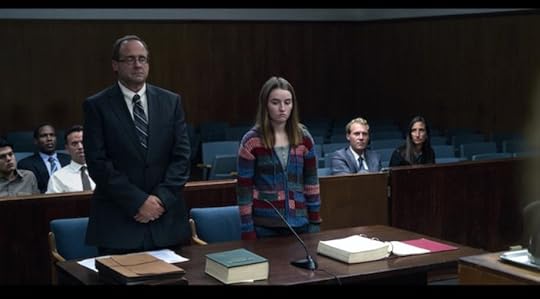
Three years later, a female detective in Golden, Colorado is called to an apartment building where a 22-year-old woman has just reported a stranger breaking in while she was asleep, raping her on and off for hours, and then making her shower.
He takes all of the sheets, comforters, etc., and leaves nothing behind with any DNA. The female detective, Karen Duvall, is so gentle with her, but persistent. She respects the victim, she treats her with dignity, she really is in all ways wonderful.

She’s also very frustrated by the case, because there’s so little crime scene evidence. She talks to her husband, who is a police officer in a neighbouring jurisdiction, about the crime, and he mentions that they had one just like it. So the next morning Detective Duvall shows up on Detective Grace Rasmussen’s doorstep, and the two of them team up to eventually catch this guy.
Unbelievable portrayed faith in an amazing way
I have rarely seen movies or miniseries do this, and I’ve actually seen Netflix being very anti-faith, so I was so impressed (and surprised!). Karen Duvall is portrayed as being a very strong Christian (as apparently the real detective is).
You see this for the first time when the victim is in the car with her, and they’re driving to the hospital. Amber (the victim) looks down, and on the dashboard is a sticky note with the words:
Here am I. Send me.
Amber (and by the way, this actress did an AMAZING job, too), asks what it means.
Karen thinks for a minute–you can see she’s trying to decide how much to divulge–and then she says something like (I’m going from memory):
It’s from Isaiah. The world is really messed up, kind of like it is today, and God is looking for people who will do something about it. And Isaiah says, Here I am, send me.

And that’s what you see from Karen for the rest of the mini-series. She’s very compassionate, but she’s also extremely professional, and even hard on the cops under her when she feels they’re not doing their jobs well. She’s absolutely dedicated to justice. She’s a great mom. But she also really struggles with her frustration when they can’t find the guy.
You see her and her family in church. And one day Amber shows up in church, too, and Karen seeks her out, just to talk.
Grace Rasmussen, the other detective, often makes fun of Karen’s faith, which Karen takes in stride. But at the very end, Grace even admitted that for the first time in a long time that morning she had said a prayer. It was a prayer rather laced with profanity, but it was still an honest prayer.
The dichotomy between the two detectives was quite stark.
Karen is dedicated, by the book, compassionate, and steady. Grace is a firecracker, always doing things you don’t expect, not explaining herself, and getting very, very angry. She’s the senior detective, the one with all the experience. And she swears a TON. LIke a TON. I can’t stress that enough. If you can’t handle swearing, please don’t watch this show. At the same time, you can tell that the reason she swears is just the sheer awfulness of what they’re dealing with.
At one point, the two detectives are talking and Grace says, “I don’t know how you can believe in God when all of this is happening.”
And Karen replies, “I don’t know how you get through all of this without God.” And they leave it at that. And it’s suggesting to the viewer, I think, that Karen’s view is the right one.

The dichotomy between the two detectives in Colorado and the detectives in Washington was just heartbreaking and infuriating and I couldn’t watch it.
Grace and Karen treated their victims so well, even though Grace’s victim had holes in her memory in the same way that Marie Adler had. They cared for their victims. To say that Marie Adler’s detectives re-traumatized her would be an understatement.
And to be frank, I couldn’t watch it. Perhaps, had it not been based on a true story, I would have watched it. But knowing that Marie is a real person, a real girl who grew up in foster care, who had been repeatedly abused as a child, and then, when she reported a night-long terrifying rape, she was told she was the problem–I couldn’t do it. The miniseries was shown in two timelines–what happened with Marie after the rape, and the investigation three years later in Colorado. Every time Marie came on, I skipped to the next Colorado scene. I couldn’t. I just couldn’t. I’m still tearing up that anyone could be treated like that.
Please, in the comments to this, let’s not get into a discussion about false rape reports, okay? I absolutely know they happen (I’ve had some happen in my immediate circle), but I also know that they are very, very rare. And in this case, she did have bruises and scrapes. There was no reason for the police to disbelieve her. It was just a travesty.
The frustration that Grace and Karen felt about how the resources were allocated about rape and how violence against women was treated was very palpable.
In the series, they at first thought the perpetrator was a police officer because the scenes had been cleaned of DNA. So they spent quite a while focusing on cops. Apparently there are studies that show that 40% of police officers are domestic abusers. They asked the question, “what if it came out that 40% of female officers abused their kids? They’d be fired in an instant.” But you can be a cop even if your wife has a restraining order against you because you’ve beaten her up. It’s not right.
That’s not to say that all cops are abusers, so let’s not go there in the comments, either, okay? And I do believe that police forces will have an increasingly difficult time attracting quality applicants when there is so much animosity towards police officers, as there is today, so I understand that things are in a catch-22.
But like Grace said when she was so angry (and I teared up about this), “Where’s the outrage that all these women are getting raped?” They’re getting helped by the FBI, and the senior FBI officer is honestly helping (though it doesn’t always seem like that), and Karen is trying to calm her down. But Grace just asks, “Where’s the outrage?” It’s the only time she really loses it in the show, and you can see that for the whole series both she and Karen are trying to keep the lid on their emotions.
Yet just for a minute, her guard goes down. “Where’s the outrage?”
That’s really the question the whole mini-series is asking.
“Where’s the outrage?” Where’s the outrage that Marie could be treated like that? Where’s the outrage that women whose husbands beat them up have little recourse but a restraining order, which basically does nothing? Where’s the outrage that there are not better computer systems and tracking systems to find rapists like this one? Where’s the outrage that so many police departments handled their rape cases so badly, and that the rapist could have been caught earlier if people had just done their jobs?
After this series airs, I think there will be some outrage. It was just really well done.
They do catch the guy, by the way.
And when they do, they find pictures of all of his victims, including one they don’t recognize–Marie Adler. He has a copy of her driver’s license photographed on her torso. So the detectives reach out to the Lynnwood police department, telling him they’ve solved a crime in his jurisdiction. The Lynnwood detective assures them that Marie was making it all up, so she asks for his email, and sends him the pictures.

He’s devastated. He goes and finds Marie at work and gives her a cheque for $500, the fine that she had had to pay. She later hires a lawyer and sues the city, but settles for $150,000 (her lawyer wanted to press for more) because she just wants it over with. Apparently she’s now married, with two children, and living in a different state. She has a good life now, and I’m glad. I wish her all the best.
I couldn’t help feeling some parallels to what is happening today in the church with abuse.
After watching the series, I got in a big funk. Not because of the series itself, but because of how it reminded me of how the church is handling abuse today, and how so much abuse is being swept under the rug. It brought up my frustration and–I finally admitted this to myself this weekend–my extreme grief that Focus on the Family has not cared about the fact that Love & Respect, which bears their logo and which they recommend, has enabled abuse. Despite the huge report I sent them, despite repeated emails and twitter threads, they have said nothing. They haven’t cared. The voices of women who are being abused do not matter.
But now, I have had others reach out to me in the last month telling me that Focus on the Family counselors have told them to return to abusive husbands once those husbands have “repented” (really bad advice, because love bombing is a normal part of the abuse cycle). I have learned that Focus on the Family says you can’t divorce in cases of abuse, only separate for a time. For years I have been recommending Focus on the Family . I am so, so grieved by that now. What did I send them to? Please, please forgive me. I didn’t know.
And I’m just so very, very sad. I actually think it is grief. Because this was my tribe. I trusted them. I thought they were good. I was on their radio show three times!

And to see them doing this to women is just sometimes more than I can bear emotionally.
I feel as if so many churches and organizations are doing to abused women what those initial detectives did to Marie. They grill her. They’re antagonistic. And eventually they make it into her fault. They tell her to admit her guilt (“did you not submit enough? What did you do to provoke him? Did you not respect him?”). And they leave her unsupported.
This is not how it is supposed to be. This is not Jesus.
Jesus is there, looking at His church, asking a simple question, “Where is the outrage?”
And I am here, replying, “Here I am. Send me.”
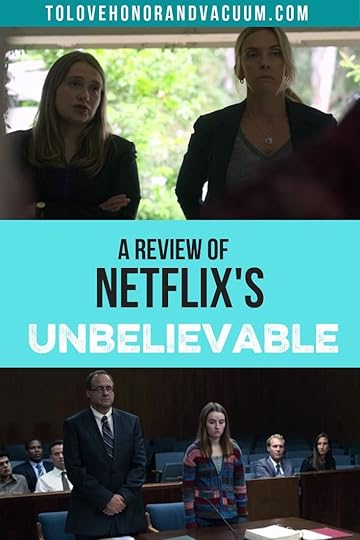
Have you watched Unbelievable yet? What did you think? Does any of this resonate with you? Let’s talk in the comments!
Like this post? You may also appreciate:

How Churches Should Handle Sexual Abuse Allegations
Author
Social Media
Sheila's Best Posts
Books
Courses
Freebie
 Sheila Wray Gregoire has been married for 27 years and happily married for 22! She loves traveling around North America with her hubby in their RV, giving her signature "Girl Talk" about sex and marriage. And she's written 8 books. About sex and marriage. See a theme here? Plus she knits. Even in line at the grocery store.
Sheila Wray Gregoire has been married for 27 years and happily married for 22! She loves traveling around North America with her hubby in their RV, giving her signature "Girl Talk" about sex and marriage. And she's written 8 books. About sex and marriage. See a theme here? Plus she knits. Even in line at the grocery store. Find Sheila Here:
Find Sheila Here:YouTube
Sheila's Favorite Posts on To Love, Honor and Vacuum:
10 ways to initiate sex
10 Effects of Porn on Your Brain, Marriage, & Sex Life
Why So Much Marriage Advice is So Trite
How can Sex be Hot and Holy at the Same Time?
Check out some of Sheila's Books:
The Good Girl's Guide to Great Sex
31 Days to Great Sex
9 Thoughts That Can Change Your Marriage
To Love, Honor, and Vacuum
Check out Sheila's Courses:
The Boost Your Libido Course
The Whole Story: Talking to Your Daughter about Sex, Puberty, and Growing Up
The FREE Emotional Intimacy E-Course
Are you ready to take your marriage to the next level?
Sign up for our emails and get access to the TLHV free marriage and parenting resource library. We have over 25 downloads and are constantly adding more. Sign up here!
September 13, 2019
Do Only Christians Have Good Marriages?
Do you need to be a Christian to have a good marriage?
Last week I wrote a post on what makes a good marriage. When I was initially sketching out my points, I instinctively wanted to include something about letting Jesus lead your marriage, or having the power of the Holy Spirit in your life. I feel like Jesus is a huge part of my marriage, because I know that I live and breathe in Him, and it’s hard to separate Him from my own experience of my life with Keith.
But the more I thought about it, the more I realized I couldn’t put those points in that article, for one simple reason: I know a lot of people who weren’t Christians who have great marriages.
I think Christians make a mistake when we think that the only way a person can do the right thing is to know Jesus.
God created humanity in His image. And in Romans 1, Paul writes about how people can sense different elements of God’s character from nature alone. He writes in the next chapter about people who have never heard the message of Jesus but who still instinctively act as if they have. And all that leaves me with this conclusion:
All of us are made in the image of God. When we do the right thing, we’re reflecting Jesus, whether we realize it or not.
Many people are walking through this earth reflecting the image of God–being image bearers, so to speak. They may not know it. They may never call it that, or even vehemently deny it. But when we act with love, we reflect God, because God is love.
And that’s why, I think, non-Christians can have great marriages.
Now let me add another layer to this.
A while ago in the comments, we were talking about setting boundaries when husbands cheat, and someone made a list of things that shouldn’t be tolerated, and in that list was child porn. I replied to that comment off-handedly, saying something to the effect of, “oh, and if your husband uses child porn, call the police! Real children are being harmed, and the police need to know so that they can potentially rescue them. And this stuff needs to be turned over to law enforcement.” Well, a commenter was super offended by that, and wrote back. I told the story on Facebook, and it resulted in hundreds of comments in response:
My Facebook Thread:
Should you report a husband who uses child porn?
In a comment recently, I said off-handedly to someone who had used child porn as an example, that if you find your husband using child porn, report it! The police need to know so they can rescue as many kids as possible, and that’s a serious crime.
A woman commented back this: “Report them? Your spouse shares something with you and instead of getting them treatment you report them? You have no clue what marriage is. You have no loyalty to your spouse. I am frankly shocked. I will look elsewhere on advise for a Godly marriage.”
Let’s talk about a godly marriage, shall we? A godly marriage is one where we pursue GOD, not just marriage. If we cover up a serious crime out of loyalty to our spouse, then we are making marriage an idol. Let’s remember that Sapphira got to choose between doing what was right and covering for her husband. She chose covering for her husband, and God struck her down. Pretty clear what side God was on!
Child porn is one of the worst scourges in our lifetime. Real children are being raped. It needs to be prosecuted.
This idea that loyalty to our husbands is the end all and be all is the same root that makes abuse so difficult to address. People close ranks out of loyalty, rather than doing what is right. Churches don’t address the abuse in their midst because “it might ruin our witness.” Families don’t speak up about the creepy uncle who hurts kids because “it’s not right to speak ill of family.” Well, you know what? God sides with the abused.
Whenever you choose image and appearance over truth, you make an idol of something, and God is not pleased. In everything, seek Jesus first, and do what Jesus would do.
“If anyone comes to me and does not hate father and mother, wife and children, brothers and sisters–yes, even their own life–such a person cannot be my disciple.” Luke 14:26
While the vast majority of commenters completely agreed, asking, “why is this even a question?”, I did get some comments that I found concerning. Several comments hit this tone:
Let’s all remember that we would be the ones not only watching child porn but making it if it wasn’t for the Lord. The Holy Spirit restrains some from being as wicked as they could be. I know it can be tempting but we have no room to look down on others. That could be us but by the grace of God!
What she’s essentially saying is that without Jesus, we’re all scumbags who would watch child porn. (There’s also a huge problem with sin-levelling in this comment, by saying that all sin is equal. But that’s a huge topic for another post!).
Now, I realize the theology behind it: without God, our works are all as filthy rags. I get that. But the simple truth is that (thankfully!), most non-Christians do not watch child porn, let alone make it, and most would never, ever think of such a thing. Many even commented in reply and were quite offended!

Do you have a hard time asking for what you want?
You can change the dynamic in your marriage and make talking about your own needs easier!
If your marriage is in a communication rut, it’s time for some change.
Learn More!
I think we need another way of looking at why we do good things.
People who don’t know God are capable of doing good things. In fact, I would say that many people I know who don’t personally believe in God are far kinder, loving, and more generous than many Christians I know. To say that the reason we do good things is only because we know Jesus is far too simplistic.
We do good things because God is good; God made humanity; and we are created with “eternity in our hearts” (Ecclesiastes 3:11) so that we know what is good and what is evil.
That doesn’t mean that everybody knows that. Many can silence their conscience. But humanity is in the image of God, and God is love, and so we should not be surprised if non-Christians act in a loving way!
When we talk as if non-Christians can’t do anything right, though, because they don’t know Jesus, we sound crazy and judgmental.
Telling a non-Christian something like:
I’m so glad I’m a Christian because otherwise I could be watching child porn!
Is not really a recipe for them wanting to come to know Christ. Remember, people can deny God and still be image bearers. That isn’t a good reason for becoming a Christian–so that then you won’t be a raging rapist or a Hitler in training. If I were to sum up why people should want to know Jesus, I would talk about these aspects:
You know that there is a purpose to your life
You feel a sense of belonging. You know someone knows your whole life, and is watching over you, and cares.
You feel deeply loved.
You have a mission now–a reason to keep going. You realize that you are infinitely important in the broader scheme of things.
You live with God’s power within you, so that you can grow, and you can change for the better.
You know that this life on earth is not all that there is; there’s a greater future for you, where you’ll get to know God better and be perfect in the way that you were actually made to be.
I think we would have a much easier time talking to those who don’t know Christ if we acknowledged that many of them act better than many who do claim Christ. I think telling those people, “You know, I believe God looks at your marriage and it makes Him so happy,” will do a lot more to lead people to Christ than telling them, “Do you realize that without Christ, you could be Hitler?”
God is pleased when people do the right thing, whether or not they know Him.
Think about the story of Jonah. God sent Jonah to talk to the people of Nineveh because the people were horrendously violent. He told them to repent or God would smite them. They repented, and God relented. But nowhere in that book does it say that they understood who God was or started practising the Law (which was how people knew God back then). They simply stopped being violent, and that made God happy.
Or take the parable of the Good Samaritan! Jesus pointed out that the Samaritan, who did not know God, actually acted more like God than the Levite and the priest who DID know God. And Jesus told us to go and be like that Samaritan. (Luke 10:25-37).
I think Christians make a mistake when we think that the only way a person can do the right thing is to know Jesus.
And to say that the reason we do good things is only because we know Jesus is far too simplistic.
(Click here to tweet this quote)
So why do I follow Jesus?
I’ll leave you with two quotes–one from the apostle Peter, and one from C.S. Lewis.

John 6:67-68
So Jesus said to the twelve, “Do you want to go away as well?” Simon Peter answered him, “Lord, to whom shall we go? You have the words of eternal life.”
And here’s C.S. Lewis:
I believe in Christianity as I believe that the sun has risen: not only because I see it, but because by it I see everything else.
Knowing Jesus opens up life. I am forever grateful. I am growing. But I don’t need everyone who doesn’t know Jesus to be terrible and awful to give my faith meaning. I think that’s a better perspective.

What do you think? Can you act right without God? Let’s talk in the comments!
Check out these posts on safe versus unsafe counselling practices:

10 Questions to Ask a Biblical Counselor

What Safe Counseling Looks Like
Author
Social Media
Sheila's Best Posts
Books
Courses
Freebie
 Sheila Wray Gregoire has been married for 27 years and happily married for 22! She loves traveling around North America with her hubby in their RV, giving her signature "Girl Talk" about sex and marriage. And she's written 8 books. About sex and marriage. See a theme here? Plus she knits. Even in line at the grocery store.
Sheila Wray Gregoire has been married for 27 years and happily married for 22! She loves traveling around North America with her hubby in their RV, giving her signature "Girl Talk" about sex and marriage. And she's written 8 books. About sex and marriage. See a theme here? Plus she knits. Even in line at the grocery store. Find Sheila Here:
Find Sheila Here:YouTube
Sheila's Favorite Posts on To Love, Honor and Vacuum:
10 ways to initiate sex
10 Effects of Porn on Your Brain, Marriage, & Sex Life
Why So Much Marriage Advice is So Trite
How can Sex be Hot and Holy at the Same Time?
Check out some of Sheila's Books:
The Good Girl's Guide to Great Sex
31 Days to Great Sex
9 Thoughts That Can Change Your Marriage
To Love, Honor, and Vacuum
Check out Sheila's Courses:
The Boost Your Libido Course
The Whole Story: Talking to Your Daughter about Sex, Puberty, and Growing Up
The FREE Emotional Intimacy E-Course
Are you ready to take your marriage to the next level?
Sign up for our emails and get access to the TLHV free marriage and parenting resource library. We have over 25 downloads and are constantly adding more. Sign up here!
September 12, 2019
PODCAST EXTRAS: What’s Making Sex Expensive? Plus Why Life is Just Dangerous for Women
Can we talk about the economics of sex?
It’s time for another edition of the To Love, Honor and Vacuum podcast, and this week we’re talking about how to have more sex!
I hope you all will listen to the podcast and consider this extras. I like to leave more things to read based on what I said on the podcast. So, without further adieu, give this a listen:
Main Segment: Why Aren’t You Having More Sex?
I’m a huge fan of Economics 101. As I explained in the podcast, I took it three times in my life, and then I taught it to my girls, too, when they were taking online university courses.
One of the concepts that I find really helpful is the relation between demand and supply. Now, for our purposes today, you don’t have to understand all of it. But here’s the jist:
Sex is going to get more expensive (or harder to get) if the individual ingredients that make sex possible become harder to get. And when things are harder to get, you don’t get as much of them. In other words, you have less sex.
I’ve explained this in detail in this post on Economics and Sex. And I made this horrible graphic that tries to explain what happens when the “price” of everything that goes into sex goes up. You get less sex!
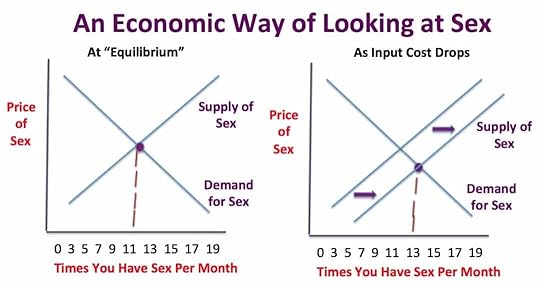
And then this week I was talking about 10 reasons you’re not having more sex.
Of course, the main reasons are always libido issues, or relationship issues, or trauma issues, and things like that. But I’ve talked about those a lot. And today what I want to show you is that sometimes it’s just a lot more mundane. It doesn’t mean that there’s anything particularly sinister going on, or that we’re broken, or the relationship is broken. It’s just that life is getting in the way. So what can we do to stop that from happening?
That was the focus of our challenge this week!
Take a look at the 10 reasons you may not be having sex, and identify 1-2 to tackle. Have your husband look through the list, too!

Are you TIRED of always being too tired for sex?

Do you yearn to actually WANT to make love–and figure out what all the fuss is about?
There is a way! And in this 10-module course I take you through what libido is (it may surprise you!), what affects libido, and how we can reclaim the excitement that God made us for.
Tell me more!
Reader Question: How Do We Stop Life From Getting in the Way?
Rebecca and I dealt with two quite similar questions about how to keep the relationship alive when life is just busy. Here’s the big one that we tackled:
Right now my husband and I are having a hard time spending time together. We have been married a few years, and together for a little longer. We have two kids under 2 and then an older child. Our sex life before was amazing but now our living situation has us with my in-laws. My husband works and my daughter goes to school more than an hour from the house so they have to get up and leave the house by 6 and I often don’t see him again until after dinner. So when my husband and I get to talk its usually on the phone, there are days that we want to be intimate and plan to but by the time we are able to we are just too tired. We know we love each other and we talk about it but we are struggling to get that time. So how can we get to enjoy each other’s company without all the distractions?
We went into a lot more detail in the podcast, but I’ll say two quick things here: You can put up with anything if there’s an end date. But if there’s no end date, make one. You can’t live like this for an extended time. Maybe it means you re-evaluate what you want out of life (as in where you live, or what you do for work), but this has to change.
The second thing which may not relate to this woman in particular (it depends WHY her child is going to school so far away) is that you don’t have to sacrifice your life for your child to have a perfect life. It’s okay for a child not to have a perfect life if it means you don’t have a miserable life. I know a lot of parents who sacrifice everything for one child’s happiness, but then the family loses too much. The family matters, too, which is what I was saying on Monday on our post about kids’ schedules and extracurricular activities.
Comment: Yes, men are responsible for sexual assault. But women should still learn to minimize risk.
When I published the post last week about 10 tips to teach a daughter to stay safe from sexual assault on campus, I had a number of people tell me that the way to prevent sexual assault is to teach men not to rape, period. We shouldn’t be putting the burden on women.
In theory, I agree, which is why I started that post with that hilarious Twitter thread about putting the onus back on men.
But at the same time, that’s simply not going to happen. You can’t educate evil out of people. There will always be evil people around us. And so I think it’s much better to teach basic things to help minimize (though we can never eliminate) risk. That doesn’t mean you’re responsible if something happens. But to say, “I’m not going to teach my daughter anything because it shouldn’t be her burden to carry” may be politically true, but personally, I would rather my daughter stay safe.
Politics is one thing. Real life is another. And we live in the real world, even if it’s ugly.
So that’s it for the podcast today. Please listen in, and if you like it, leave a 5-star review and subscribe, because the more people review it, the more will listen!

And let me know: Do you think it’s fair to address sexual assault prevention at girls, too? And what do you think of my economics and demand and supply (because that was fun to record!). Let’s talk in the comments!
Author
Social Media
Sheila's Best Posts
Books
Courses
Freebie
 Sheila Wray Gregoire has been married for 27 years and happily married for 22! She loves traveling around North America with her hubby in their RV, giving her signature "Girl Talk" about sex and marriage. And she's written 8 books. About sex and marriage. See a theme here? Plus she knits. Even in line at the grocery store.
Sheila Wray Gregoire has been married for 27 years and happily married for 22! She loves traveling around North America with her hubby in their RV, giving her signature "Girl Talk" about sex and marriage. And she's written 8 books. About sex and marriage. See a theme here? Plus she knits. Even in line at the grocery store. Find Sheila Here:
Find Sheila Here:YouTube
Sheila's Favorite Posts on To Love, Honor and Vacuum:
10 ways to initiate sex
10 Effects of Porn on Your Brain, Marriage, & Sex Life
Why So Much Marriage Advice is So Trite
How can Sex be Hot and Holy at the Same Time?
Check out some of Sheila's Books:
The Good Girl's Guide to Great Sex
31 Days to Great Sex
9 Thoughts That Can Change Your Marriage
To Love, Honor, and Vacuum
Check out Sheila's Courses:
The Boost Your Libido Course
The Whole Story: Talking to Your Daughter about Sex, Puberty, and Growing Up
The FREE Emotional Intimacy E-Course
Are you ready to take your marriage to the next level?
Sign up for our emails and get access to the TLHV free marriage and parenting resource library. We have over 25 downloads and are constantly adding more. Sign up here!
September 11, 2019
The 3 Kinds of Marriage Problems–and Why We Shouldn’t Confuse Them
There is no one-size-fits-all for dealing with marriage problems, because not all marriage problems are alike.
This month, our Wednesday series is all about reducing stress in marriage and getting to the root of what’s really bothering you. Last week we talked about how to uncover the sources of stress in our lives, and today I want to look at the different types of marriage problems that we may experience.
And thank you to the Get Your Marriage On app for sponsoring this series!
When Keith and I started speaking at FamilyLife marriage conferences, we were given a curriculum used by FamilyLife USA for the Weekend to Remember, and we had to adapt our talks to fit the curriculum. But I always found the resolving conflict talk difficult, and it always felt like I was trying to put square pegs into round holes (which is why I’m glad that Canada rewrote the entire weekend and does it very differently now!). Part of the issue was that the conflict talk always focused on when there is a big disagreement, and then it focused on how to give and grant forgiveness. But not all conflict falls into those categories.
Why focus on forgiveness if you’ve just been having a simple difference of opinion, and you’ve had a hard time figuring out how to make a decision? Why focus on how to listen better if your spouse is watching porn or having an affair or abusing you? Different issues require different strategies.
So I’ve been thinking about a better way to picture conflict in marriage.
I’ve talked about part of this before–in this post on Why I’ve Stopped Resolving Conflict. It’s an important one on how to come to an agreement, and it focuses on a key teaching in my book 9 Thoughts That Can Change Your Marriage about the importance of identifying the underlying emotional need and then brainstorming to meet it, rather than squabbling over the correct course of action. That’s actually a lot more productive!
Today I’d like to take that one step further and break down the different types of conflict in a marriage, and why it’s important to deal with them differently.
I think conflicts in marriage can be divided into three different root causes: character issues, personal issues, and relationship issues.
Let’s see what that looks like!
Character Issues: When marital conflict is due to one person’s sin
Sometimes the reason we’re having conflict in a marriage is because one person is doing something wrong. They may be overspending and going into debt, and refusing to talk about budgets. They may be refusing to work, and relying on their spouse to do 90% of the housework and paid work. They may be watching porn or having an affair. They may be abusive, either physically, emotionally, financially, or sexually. (And, yes, men can be victims of abuse, too).
In all of these cases, one person is doing something that is harming the marriage.
How this should be addressed: Boundaries must be drawn so that the spouse doing wrong understands that this will not be tolerated and so that the spouse begins to reap the consequences of their actions. They don’t get to have the benefits of marriage if they are also destroying the marriage. Ideally, people can be brought into the relationship to tell the offending spouse that this will not be tolerated in their wider social circle, either. Counselling can be sought, but it primarily should be individual counselling, especially in cases of abuse, where couples counseling often provides the abuser another way to traumatize the victim.
Where we may go wrong: Unfortunately, a lot of marriage teaching, especially in the church, focuses on being more giving and more selfless (and they often use Bible verses about how Jesus gave up everything to give this message). However, this is taking the biblical mandate to be selfless out of context. We need to remember God’s aim: He wants us to look like Christ. Enabling sin does not help people move towards Christlike behaviour. And God also cares about our welfare! Allowing someone to hurt us does not accomplish God’s plans. As well, counselling in these situations may focus on how to improve communication, or how to spend more time together and have more date nights. But when someone is seriously hurting the marriage, that must be addressed before we work on anything else.
 Boundaries in Marriage
Boundaries in Marriage Is It Me? Making Sense of Your Confusing Marriage
Is It Me? Making Sense of Your Confusing Marriage The Emotionally Destructive Marriage
The Emotionally Destructive MarriageFor examples of how counseling can go wrong, see this list of 98 ways a woman can sin against her husband. This list was given to a woman whose husband had been abusive and had been having an affair, and is a great example of handling sinfulness the entirely wrong way. Counseling can be a wonderful tool, but it must be good counseling.
Individual Issues: When marital conflict is due to one person’s hurt and unresolved problems
Some people start marriage with a lot more baggage than others. They were hurt, neglected, or belittled growing up, and so they have little sense of self or little confidence. That may lead to someone who becomes angry at the drop of a hat because they don’t want to be seen as “less than”. Alternatively, it could lead to someone having no drive in life and having difficulty getting a job because they’re so passive. Or maybe they were abused growing up, and have difficulty handling anger or handling any kind of conflict whatsoever. Or perhaps that abuse was sexual, and that sexual abuse is wreaking havoc with their sex life.
We all are a little bit broken, but some people’s brokenness takes a much bigger toll on the marriage. Healing from hurts can often take a lot of time and effort, and it can be quite emotionally difficult to even start that healing process. It requires facing things that you went through that you may not yet be ready to face.
The other problem is that brokenness can cross over and become selfishness. Broken people can become abusive (though not all do). Broken people can become lazy and have a difficult time getting a job, or can have a difficult time doing basic parenting tasks and can neglect the children. Not all sinful behaviour is caused by brokenness, but some is, and so untangling the mess becomes very difficult.
How this should be addressed: When the brokenness is not causing abusive behaviour, but simply self-destructive behaviour or relational problems, two things are needed: a ton of patience and love, and encouragement to get qualified help. Love unconditionally. Let the spouse know that they are safe. But also tell them that you care about them, and you don’t want to see them stuck. You want to help them as they get healing. In many ways, this is part of the “in sickness and in health” vows that we make at the wedding. Some people have much more sickness, and that sickness is not always physical. When the brokenness is also causing sinfulness, as above, then boundaries need to be set and individual counseling should be pursued to deal with the harmful behavior first. Then, any true healing will have to also address the underlying causes.
Where we may go wrong: We may get the wrong kind of counseling. Rachael Denhollander said, about abuse victims and trauma survivors, that she has never met anyone who went to biblical counseling who did not come out worse off. Find a licensed counselor (preferably one who is also a Christian) who understands trauma and knows evidence based treatments.
Are you PeaceKEEPING or PeaceMAKING?

There’s a huge difference between the two. And if you don’t get it right–you’ll never be able to feel truly intimate in your marriage.
There’s a better way!
Learn more!
Relationship Issues: When marital conflict is due to two people seeing the world and their relationship in different ways
Then there are just the normal differences that any couple has–you have different love languages or different emotional needs. Because of that, you don’t always feel loved. Maybe you’re very different personalities (I have a great series on the MBTI and marriage which can point out some of these big differences!). Or maybe you’re simply disagreeing on a decision, and you can’t seem to figure out what to do.
How this should be addressed: Take the emotional needs quiz below! It’s a great tool to help you identify what you each need to feel loved that goes beyond love languages. Figure out what personality type you are so that you can understand each other better and make allowances for each other. Follow the game plan I laid out in 9 Thoughts that Can Change a Marriage for coming to agreements when it seems like you’re at an impasse. If necessary, talk to other people or get some couples counseling to help you connect more.
Where we may go wrong: One person may decide to just “give in” and be giving, and may do this repeatedly, thinking that by surrendering more they are doing the right thing in their marriage. However, when this imbalance keeps up, year after year and decade after decade, the drift can get worse. We should be showing grace, letting little things go, and not insisting on our own way. However, if this is taken too far, with no consideration given to one person’s needs, then giving in can actually cause more problems. Like I talked about last week in my post on how to build a good marriage, both people matter in a marriage. You can’t have intimacy if one person’s needs are consistently being ignored. If this is the case in your marriage, talk about it. Be bold. And seek counseling if necessary.
Another potential landmine that I’ve seen repeatedly is that, if there’s a disagreement, it’s assumed that you should just do what the husband wants because the wife is to submit to him. However, this both misunderstands submission and short circuits what God may be doing in the marriage. It’s far better to seek His will, not just to do the husband’s will.
Confused about how to make decisions? You may benefit from:
Are you following Jesus or your husband?
Does submission mean that in the case of ties, he wins?
Marriage Podcast: What does headship in marriage really mean?
Read 9 Thoughts that Can Change Your Marriage!
So there you go–the 3 different types of conflict in marriage, and how they should be dealt with.
We should not use a one-size-fits-all approach, like “you just need more date nights!” or “you need couples counseling!”. No, sometimes you need individual counseling. Sometimes you need to be more giving; sometimes you need to be bold and draw boundaries. When you treat abuse as if it’s just a disagreement, you make the abuse worse. But when you treat a simple disagreement, or not understanding love languages, as if it’s a big sin or evidence of selfishness, you create a whole host of other problems.
Get Your Marriage On!
Have you tried the Get Your Marriage On app yet? I talked about it last week, and I think it’s a super fun way to enhance your marriage.
Get Your Marriage On! The Marriage Counseling App that is Fast, Fun and NEVER BORING! Frankly, we could all use a tune up time to time. But it’s more than just counseling. It’s for any couple that’s looking to connect with their spouse better.
And I have to tell you, I was so impressed with the teaching in its resolving conflict module. If you’re having a decision that you just can’t make, or if you just can’t see eye to eye, Get Your Marriage On can help walk you through it.
They do a great job of integrating the amazing (and healthy!) marriage research from the Gottman Institute, incorporating the concepts of Perpetual vs. Solvable problems; how to prevent what Gottman calls “The Four Horsemen”, including flooding (which often shuts men down especially); how to actively listen; and more. And they include Gottman’s research, too, that the most successful couples are those that allow your partner to have influence–especially when MEN allow women to influence them. So they work directly against this idea that the man has to make all the decisions. It really is focused on a healthy marriage.


It’s a fun app to go through, with teaching videos and quick exercises, but also lots of games and conversation starters. For all of you who don’t want to sit down and read a whole book, this has bite-sized videos and immediate action steps so that you can learn small bits, put them into practice, and move on.


So thanks to Get Your Marriage On for sponsoring this post!
Next time you’re experiencing conflict, ask: Is this about us? Is this about my spouse’s sin? Is this about me being selfish? Or is this about one of us being broken? And then handle it accordingly!

What do you think? Do you find these distinctions helpful? Where do you find that you usually go wrong? Let’s talk in the comments!
Like this post? You should also check out:

How Thoughts Can Change a Marriage

10 Christian Pat Answers that Don’t Always Work
Author
Social Media
Sheila's Best Posts
Books
Courses
Freebie
 Sheila Wray Gregoire has been married for 27 years and happily married for 22! She loves traveling around North America with her hubby in their RV, giving her signature "Girl Talk" about sex and marriage. And she's written 8 books. About sex and marriage. See a theme here? Plus she knits. Even in line at the grocery store.
Sheila Wray Gregoire has been married for 27 years and happily married for 22! She loves traveling around North America with her hubby in their RV, giving her signature "Girl Talk" about sex and marriage. And she's written 8 books. About sex and marriage. See a theme here? Plus she knits. Even in line at the grocery store.
 Find Sheila Here:
Find Sheila Here:
Facebook
Twitter
Instagram
YouTube
Pinterest
Sheila's Favorite Posts on To Love, Honor and Vacuum:
10 ways to initiate sex
10 Effects of Porn on Your Brain, Marriage, & Sex Life
Why So Much Marriage Advice is So Trite
How can Sex be Hot and Holy at the Same Time?
Check out some of Sheila's Books:
The Good Girl's Guide to Great Sex
31 Days to Great Sex
9 Thoughts That Can Change Your Marriage
To Love, Honor, and Vacuum
Check out Sheila's Courses:
The Boost Your Libido Course
The Whole Story: Talking to Your Daughter about Sex, Puberty, and Growing Up
The FREE Emotional Intimacy E-Course
Are you ready to take your marriage to the next level?
Sign up for our emails and get access to the TLHV free marriage and parenting resource library. We have over 25 downloads and are constantly adding more. Sign up here!



